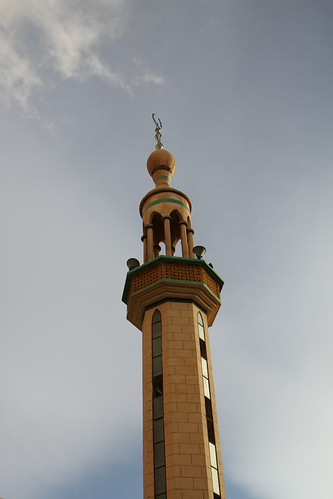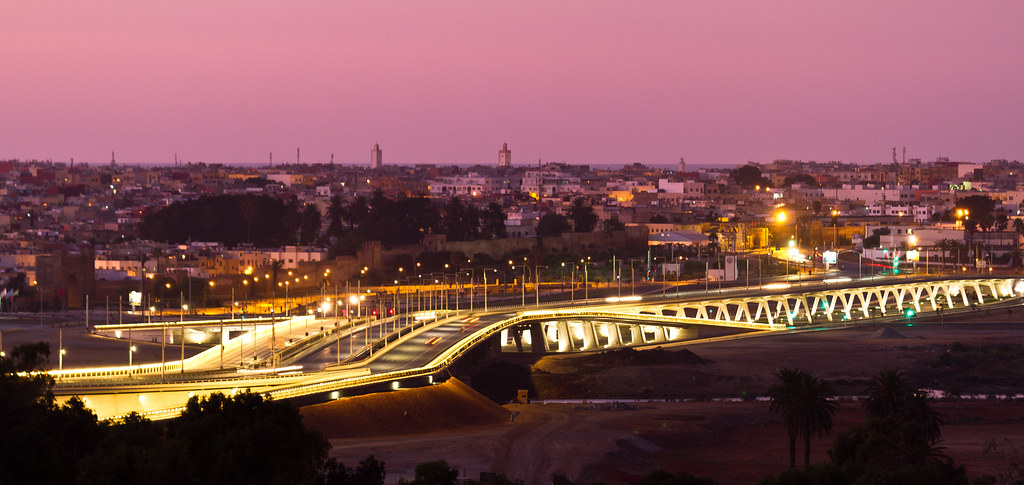A few things I learned last night over drinks with some Moroccan friends:
1. Social Rules - In Arabic, there is a popular saying where one person asks: "Who leaves the group first?" and everyone answers, "Satan."
This phrase really sheds light on Moroccan social habits. Friendship in Morocco happens quickly, but keeping and cultivating a strong bond between friends is a favorite (and highly prioritized) pass time of Moroccans. Leaving a social situation prematurely can result in severe hshuma (shame) upon you.
2. Couscous Origins - The tradition of Friday couscous came out of necessity. In Morocco, Saturday is the souq, or market, where everyone goes to get their meat, fresh produce, and other goods. The rest of the week there were no new shipments coming into the medinas, which meant that by Friday everyone was trying to use all their leftover produce before the souq the next day. The best way to do this was by making a stew of vegetables and meat. To make it more filling, they also steam semolina grain (couscous) to eat with the dish. In a way you can think of couscous as filling a similar cultural/gastronomical role as paella in Spain or bouillabaise in France.
I was also told that their is a folk tale about a man who came to Morocco and fell in love with a woman from afar. When he left the country he couldn't stop thinking about her and knew he needed to return to find her and marry her. The man returned to Morocco in search of the woman and didn't eat for days. He finally found her on Friday after days of not eating. He was very weak and requested a "complete" meal, filled with meat, vegetables, and grains, so that he could regain his strength. The result? Couscous.
3. Moroccan Progress in the form of a Feed Lot - Morocco is in the midst of building its first feed lot down south. Up until now, their meat and dairy industry has been kept relatively small with the exception of a few major companies. While it breaks my heart to think that in ten years the meat and dairy industry in Morocco may be very similar to the United States, it shows how development is not a black and white issue. While there are clearly many benefits to progress and development on all levels of society, with it come inevitable sacrifices. Furthermore, can standard butchering practices at feed lots conform to halal requirements?
4. Best Kept Secret to Filming in the Middle East - Don't let the traditional gulf-style wardrobe fool you: the new M.I.A. music video, "Bad Girls" was filmed in a desert town in southern Morocco called Ouarzazate; home to Atlas Film Studios. This film studio has been used over the decades as a cheap and safe alternative backdrop for desert and post-apocalyptic films, such as Babel, Star Wars, Body of Lies, and The Green Zone, among countless others. Morocco is also a popular choice for directors whose films are set in the Middle East. How can you tell if a film is actually shot in the Middle East or in Morocco? Look at the minarets. In the Middle East all minarets are cylindrical. In Morocco they are square as a result of the Andalusian influence.
1. Social Rules - In Arabic, there is a popular saying where one person asks: "Who leaves the group first?" and everyone answers, "Satan."
This phrase really sheds light on Moroccan social habits. Friendship in Morocco happens quickly, but keeping and cultivating a strong bond between friends is a favorite (and highly prioritized) pass time of Moroccans. Leaving a social situation prematurely can result in severe hshuma (shame) upon you.
2. Couscous Origins - The tradition of Friday couscous came out of necessity. In Morocco, Saturday is the souq, or market, where everyone goes to get their meat, fresh produce, and other goods. The rest of the week there were no new shipments coming into the medinas, which meant that by Friday everyone was trying to use all their leftover produce before the souq the next day. The best way to do this was by making a stew of vegetables and meat. To make it more filling, they also steam semolina grain (couscous) to eat with the dish. In a way you can think of couscous as filling a similar cultural/gastronomical role as paella in Spain or bouillabaise in France.
I was also told that their is a folk tale about a man who came to Morocco and fell in love with a woman from afar. When he left the country he couldn't stop thinking about her and knew he needed to return to find her and marry her. The man returned to Morocco in search of the woman and didn't eat for days. He finally found her on Friday after days of not eating. He was very weak and requested a "complete" meal, filled with meat, vegetables, and grains, so that he could regain his strength. The result? Couscous.
3. Moroccan Progress in the form of a Feed Lot - Morocco is in the midst of building its first feed lot down south. Up until now, their meat and dairy industry has been kept relatively small with the exception of a few major companies. While it breaks my heart to think that in ten years the meat and dairy industry in Morocco may be very similar to the United States, it shows how development is not a black and white issue. While there are clearly many benefits to progress and development on all levels of society, with it come inevitable sacrifices. Furthermore, can standard butchering practices at feed lots conform to halal requirements?
4. Best Kept Secret to Filming in the Middle East - Don't let the traditional gulf-style wardrobe fool you: the new M.I.A. music video, "Bad Girls" was filmed in a desert town in southern Morocco called Ouarzazate; home to Atlas Film Studios. This film studio has been used over the decades as a cheap and safe alternative backdrop for desert and post-apocalyptic films, such as Babel, Star Wars, Body of Lies, and The Green Zone, among countless others. Morocco is also a popular choice for directors whose films are set in the Middle East. How can you tell if a film is actually shot in the Middle East or in Morocco? Look at the minarets. In the Middle East all minarets are cylindrical. In Morocco they are square as a result of the Andalusian influence.
 |
| Koutoubia Mosque, Marrakech |
 |
| Minaret in Syria |
Oh, also the trick when they drive the cars on two wheels is no CGI-magic. Apparently it is a relatively popular pass time in the Gulf for guys who want to "soup up" their cars. To my knowledge, Moroccans still prefer the simpler thrill of speeding and parking lot doughnuts.






.JPG)
.JPG)

.JPG)

